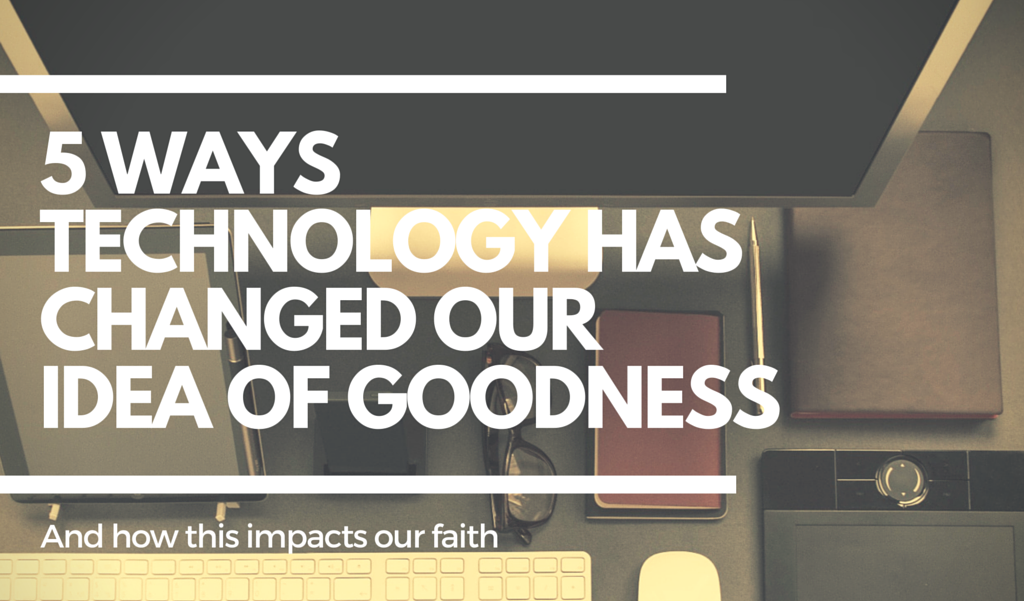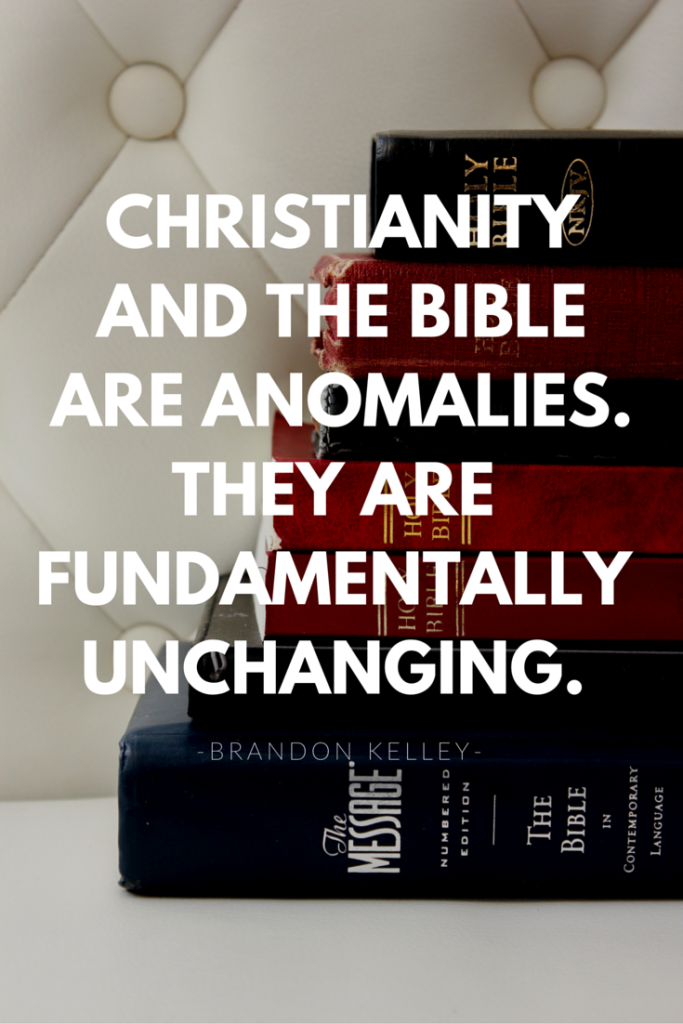
I’ve heard it said that our world has changed more in the last fifteen years than it had in all its time prior combined. I’m not sure how much validity there is to that statement or how you would prove it, however, it seems plausible. This much I know for sure: the way we go about everyday life has dramatically changed because of technology. And this doesn’t just impact what’s in our pockets or in our hands, it goes much deeper than that.
Technology impacts the way we understand what goodness is. This impacts commerce, productivity, families, the Church, and individuals a great deal. When we deem something to be good, it says a lot about what we value as people and what we value as people has been dramatically impacted by the infusion of technology within our society. This topic is garnering more and more attention, and it is being called a theology of technology. Quite interesting, eh?
5 Ways Technology Has Changed Our Idea of Goodness
1. If it’s fast, it’s good. If it’s slow, it’s out of date.
We live in the time of fast-food, fast cars, fast computers, fast internet, fast money, fast phones, fast, fast, and more fast. If we were to look at this on the surface, we could stop there, but it’s deeper.
We receive news from around the world instantaneously. When we used to watch the evening news only, we now are able to consume the news at any time from anywhere.
This impacts education and the way we expect to learn something. Instead of waiting to take a course on something, we can hop on YouTube and figure out how to do something. To take years to master some thing is foreign. We expect that we can simply watch a few tutorials, read a few blogs, and know what we need to know about whatever topic. Heck, sometimes we’ll read a headline and make a judgment on the entire article without even reading it – it’s faster that way.
Most of all, this impacts the way we understand discipleship. Instead of a lifetime of humble submission, service, learning, and love, we have become infatuated with the idea that we can take part in a Bible study and expect to have everything instantaneously change.
We now want a microwaved faith and a microwaved disciple-making strategy. And, unfortunately, many churches are conceding to this desire and trying to offer the best possible microwave possible. We don’t count the cost of following Jesus, we simply say, “yep, I believe that what’s next?” We look for religious experiences where we go from high to high to high, ignoring the fact that discipleship is less about religious highs and more about depending on God through the roller coasters of life.
When it comes to our faith, we have tried trading in a crock pot for a microwave, and have expected the taste to be the same. How silly of us.
2. Simplicity is best. Complexity? Ain’t nobody got time for that!
Blackberry phones used to be the phone market champ. They were the undisputed heavyweight champion, enjoying victory after victory. But then something happened. The iPhone.
What was so revolutionary about the iPhone wasn’t necessarily it’s look, it was it’s simplicity. Not everyone could figure out how to effectively use a Blackberry (at least they thought so), but people could figure out the app-based iPhone.
We love simplicity. If you can say something in one sentence, don’t spend five paragraphs saying the same thing. I find myself saying such things to myself often when reading books for Seminary. Just recently I finished reading a book on the inerrancy of the Bible (a doctrine that says the original text of the Bible is without error). It was a quite dense book with a different author for each chapter. This was a book on one topic, one doctrine. Yet it was around three hundred or four hundred pages long with ten chapters that took a different look at inerrancy. They didn’t take a different view on what inerrancy is, but they looked at the doctrine from different angles. In the end, I was left with a highly nuanced understanding of this doctrine that I thought could have easily been explained in one chapter. That would have been much simpler.
It’s simple enough to understand the Gospel in its most simplest sense – take for instance, John 3:16. But what I’ve found after studying the Bible for five years is the rich complexity within the simplicity of the Gospel. Just spend some time reading Matthew 5-7 and see how much Jesus takes their simplistic understanding and causes them to have to think about the motive and heart behind the simplistic rules they were trying to keep – a much more complex thing to consider.
3. If it’s on-demand, it’s good. I’ll consume it when I’m good and well ready to.
My wife and I have been without cable for around three and a half years. But don’t worry, we haven’t missed out. We have Netflix! I love Netflix because I can watch a show whenever I want to. I don’t have to wait around for Monday at 8pm to come (when I have to concede to my wife in watching Dancing with the Stars over watching The Voice). I know, #firstworldproblems!
I think, eventually, cable tv will be no more and things will be completely subscription based where we will be able to watch shows whenever we want on any network.
Every week a number of leaders, writers, speakers, and pastors release new podcast episodes. I love podcasts. But I don’t listen to a podcast episode as soon as they are released. I listen when I can – in the car, while mowing the lawn, or while doing something that requires less concentration. I love it.
It used to be the case that a committed Christian would attend church one to three times a week. Sunday morning, Sunday evening, and Wednesday evening were designated for church. But oh, how things have changed. Committed church attendance is now considered to be twice a month. That is a huge swing in a very short amount of time. But why?
I believe it partly has to do with our infatuation with on-demand. Why go to church on a Sunday morning when we can listen to or watch the whole service or sermon when we’re ready to?
Whether we realize it or not, we have begun to value anything and everything that is on-demand and ready to be consumed whenever we’re ready. We don’t like, as much, to be obligated to certain time and place types of things.
4. Quantity is quality. Bigger is better most of the time.
How many Facebook friends do you have? How many likes do you have on your page? How many followers do you have on Twitter? Instagram? Snapchat? Pinterest? How many email subscribers do you have on your list?
No matter what it is, we want more of it. You may not be all that interested in social media presence, but you may be interested in something else where this applies.
How many things did you accomplish in your job in the past month? How can you create more output this month?
How many chapters of the Bible did you read yesterday? How many times did you pray?
We’re so easily consumed by quantity, by striving for more. But what we can easily discover is that quantity doesn’t automatically equal quality. For example, a church can be filled with thousands upon thousands of people, but if those people aren’t following Jesus and loving people, they’re not adding much value to the kingdom of God (see 1 Corinthians 12-13).
5. If it’s new, it’s to be preferred over that which is older.
New cars. New houses. New jobs. New challenges. New software. New anything. We love things that are new.
We push back against traditions and time-tested wisdom and truth. We embrace fads every chance we get. We see neon green armpit hair (it’s quite odd, but it’s new so it’s AWESOME…), guys wearing skinny jeans, new definitions of marriage, hope and change slogans, people having five to ten different career fields in their lifetime, and much more, all connected to our obsession with new.
 Our culture loves change. We love new ideas, new rules, new everything.
Our culture loves change. We love new ideas, new rules, new everything.
And then we have the Christian faith and the Bible. New isn’t exactly the word you would use to characterize these two. Unchanging is our God. Unchanging is truth. Christianity and the Bible rest on a foundation that is much different from everything else.
Because of the exuberant amount of change we experience in our society each day, we believe everything is up for change. Christianity and the Bible are anomalies. They are fundamentally unchanging.
So what?
Technology is not immoral or moral. It’s amoral. It’s indifferent. However, this doesn’t mean that it hasn’t had an impact on the way we understand life to be, the way we understand goodness to be, the way we understand our faith to be.
We have to recognize where we have begun believing things about our lives and our faith that are untrue. It may be the case that what we believe to be good isn’t good at all. Maybe the better way is the other way.
How have you seen technology impacting your perspective on goodness, life, and faith? Let me know in the comments below!
Want more?
I’d love to go on this journey of following the King with you and help you grow your faith and increase your impact. Let’s grow together. For joining the community here, you’ll get a copy of my two free eBooks: Bible Hacks: Understanding the New Testament and Do Something: Cultural Crises and the Gospel. And you’ll get my free daily devotional: Journey to Knowing God. All this (and updates when I create something new) when you subscribe to the blog.
